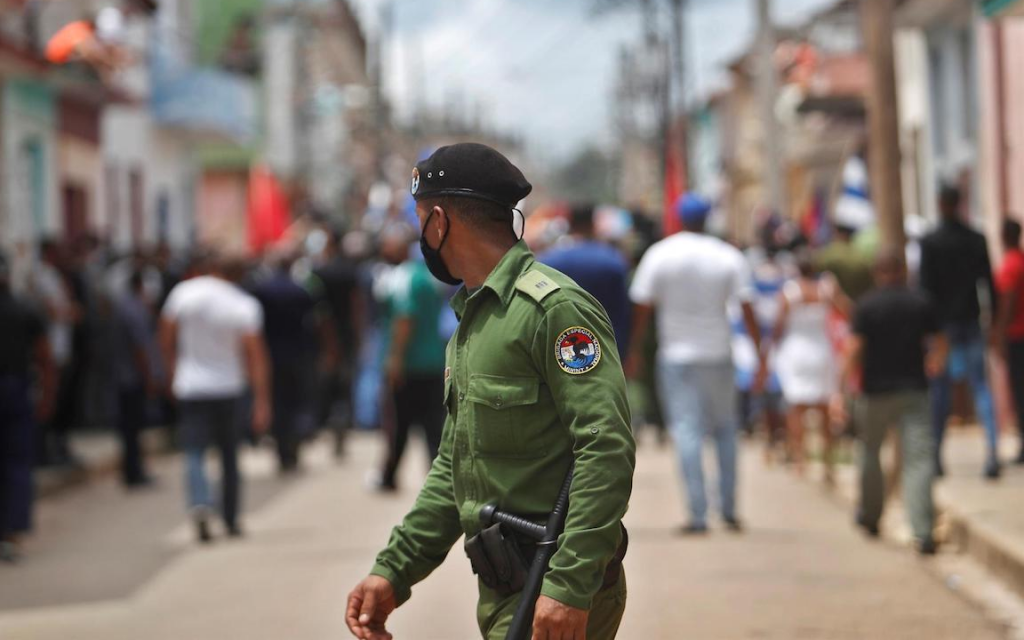Archipiélago, a self-described “platform” for civic action in Cuba, petitioned the government of President Miguel Díaz-Canel in late September to allow a march “calling for civil liberties, including the right to peaceful protest and an amnesty for imprisoned government opponents.” The so-called Civic March for Change would take place November 15 in different locations around the island country. On October 12 the government responded by characterizing the request as “illicit” and its purposes “illegitimate” — as was expected. More recently, spokespersons for Archipiélago have made it clear that they will nevertheless go ahead with the demonstrations.
The mobilization was initially scheduled for November 20 but was changed to November 15 in response to the government’s announcement of military exercises that would take place on November 18 and 19 and its declaration of November 20 as National Defense Day. It was obviously a response to the call for the demonstration — a response aimed at deploying the military across the island. In its official response prohibiting the demonstration in Havana, the government contends that the call is a “provocation” aimed at regime change. Organizers have protested the ruling, deepening the political polarization that runs through Cuba. Playwright Yunir García Aguilera, a founder of Archipiélago who was among those arrested at protests on July 11, has declared that he will continue to demand freedom for political prisoners and “respect for the full rights of all Cubans.”
We repudiate the repressive and authoritarian policies of the Díaz-Canel government and, specifically, the prohibition of the demonstration. At the same time, however, we have differences with the organizers, whom we do not support politically.
The mobilizations in July were an expression of popular discontent with the government’s economic and social policies and Cubans’ demand that they be allowed to express themselves politically. In its call, however, Archipíelago focuses on its stand “against violence, for the rights of all Cubans, the release of political prisoners, and resolving differences through democratic and peaceful means.” Completely absent is any questioning of the regime’s economic and social policies themselves, and how current problems are being unloaded on the backs of working people. There is no mention of how government measures deepen inequality and favor foreign companies. And a fundamental point is completely missing: the condemnation of the U.S. embargo.
The latter is no coincidence. Among the 20 activists and personalities who endorsed Archipíelago’s call, we find members of the self-styled Council for Democratic Transition in Cuba, presided over by opposition leader Daniel Ferrer. This group has a right-wing program to turn the island into a “market economy” through a series of restorationist measures, including compensation for expropriations carried out after the revolution as a way to “improve relations with [other] states.” In fact, the council and Archipíelago agreed to promote the call for November 15 together.
If the demonstrations happen, they may be joined by people from the working class who are dissatisfied with the current economic and social situation and the government’s repressive policies. At the same time, the participation of the pro-imperialist Council for Democratic Transition in Cuba is evidence that, in the aftermath of July 11, the right-wing opposition has expanded its efforts to ride the wave of discontent and thus promote its own policies — which are completely contrary to the interests of the working-class masses, and are, rather, aimed at capitalist restoration. Of course, the lack of democratic freedoms in Cuba facilitates the Right’s “democratic” demagoguery, but we must not forget that these are the same false champions of democracy who have defended coups d’état in Honduras and Bolivia and repressive governments such as those in Colombia and Chile.
Dissatisfaction with the Government and Its Economic and Social Policies
Clearly, the July 11 mobilizations created a new political dynamic in Cuba. They showed that there is genuine discontent among broad sectors of the working-class population with the economic and political situation and with the one-party regime and its denial of democratic freedoms.
For more than 60 years, Cuba has suffered through the embargo imposed by the world’s main imperialist power, with its terrible consequences for the population. The blockade has always aimed to strangle the island as a way to press for liquidating the social conquests of the revolution — which still stand today — and restore capitalism. The single-party Cuban regime, while curtailing the most elementary democratic rights, has for decades carried out economic and social measures that have hurt the Cuban masses and deepened social inequalities. We see this in the steps taken in December 2020: an increase in tariffs and transport rates and a 2,400 percent currency devaluation, which together created across-the-board increases in the prices for most basic necessities. And of course, the already difficult situation faced by the Cuban masses has worsened during the pandemic.
At the same time, the government has opened the country to foreign companies in a variety of sectors. This is actually a step forward on the road to capitalist restoration. For instance, as reported in July, there are the “measures to facilitate foreign investment with an ambitious ‘portfolio of opportunities’ comprising more than 500 projects, mainly in tourism and oil, to the tune of $12 billion. But most important is the announcement that no longer would the Cuban state be obligated to be the majority investor in tourism, biotechnology. That measure is a direct attack on the already battered social conquests of the 1959 revolution, favoring most the bureaucracy and upper sectors of the army — and the businesses they own — along with the middle-class “entrepreneurs” who have launched a variety of small businesses linked to the U.S. dollar and tourism, and who have been pressing to quicken the pace of the pro-market opening.
It is in this context that the government finds it must exercise its authority repressively and absolutely. It needs to deter any social and political protest, be it from those who oppose the rolling back of social conquests or from those who demand a quicker pace of reforms. The latter could threaten the control of the bureaucratic apparatus and the Cuban Communist Party over the restorationist process.
Growing social inequality and political oppression were what sparked the July 11 protests. This is the situation that sectors of the pro-imperialist right wing are trying to manipulate, such as with its July 11 slogan, “Homeland and Life” — in contrast to the revolution’s “Homeland or Death” slogan. Meanwhile, the Biden administration and the Right throughout Latin America have hypocritically and cynically declared their support for “freedom” and “democracy” on the island, aiming to take advantage of the situation as a way to propel a pure capitalist restoration that imperialism and the bourgeoisies have been after for some time.
This reveals the contradictory character of those July 11 demonstrations: an expression of discontent among impoverished Cubans, and the right-wing effort to use demands for “democracy” to bolster demands for the “freedom” to do capitalist business.
The response to the discontent from the Díaz-Canel government and the Cuban Communist Party has been to harden the repression and reaffirm one-party rule, along with the punishing economic measures that advance capitalist restoration. Imprisoning dozens of July 11 demonstrators — including many leftist activists critical of the regime, among them young members of the Communist Party itself — was part of this repression, which also included sending “shock troops” into the streets to beat people.
The astounding declarations — made in the best Stalinist style — that the July demonstrations were “counterrevolutionary” is another part of this same course by an authoritarian and repressive regime. It is a component of the entire policy of an authoritarian bureaucracy that has, historically, denied basic democratic liberties to the people while reserving for itself gross privileges, while at the same time a sector of that very bureaucracy has been transitioning to become capitalists themselves, private owners — all amid the flurry of pro-capitalist reforms implemented mostly over the last decade. The prohibition of the march called by Archipíelago is part and parcel of all this — further suppression of the most elementary democratic freedoms, such as the right to protest and demonstrate.
For Full Democratic Rights for the Working Class! Confront the Blockade and the Bureaucracy!
What is required in Cuba is a political perspective that is clearly independent of both the government and the right-wing opposition and imperialism. It begins with unequivocal opposition to the imperialist blockade and a program for meeting the most earnest and urgent demands of the broad masses. Those include a general wage increase, popular control over prices, and an end to the privileges of the ruling caste.
We must reject the bureaucracy’s authoritarianism and its claim that all the social discontent being expressed has no real social basis or legitimacy, that it is all the work of imperialism and the Cuban bourgeoisie in exile. Of course, that work is ongoing, everywhere, but we cannot abide the bureaucracy’s using it as an excuse to dismiss and repress legitimate social demands.
It is essential to defend workers’ right to organize and associate themselves in trade unions that are politically independent of the state and its bodies, if that is what they wish. We must defend the right to freedom of assembly, to meetings and deliberations in workplaces, to demonstrate, to strike, to freedom of the press, and to workers’ self-organization. To this must be added the rights of students to assemble, deliberate, and mobilize.
We must oppose the one-party regime and defend the legality of all political organizations that defend the gains of the revolution.
In the end, the only solution to today’s situation in Cuba will have to come through a new revolutionary intervention of the masses that puts a brake on the restorationist course, drives out the bureaucracy, and puts an end to its one-party regime. The solution is to establish a government of the workers themselves, a government that reverses all the pro-capitalist measures and reestablishes the monopoly of foreign trade and the democratic planning of the economy.
First published in Spanish on November 1 in La Izquierda Diario.
Translation by Scott Cooper











